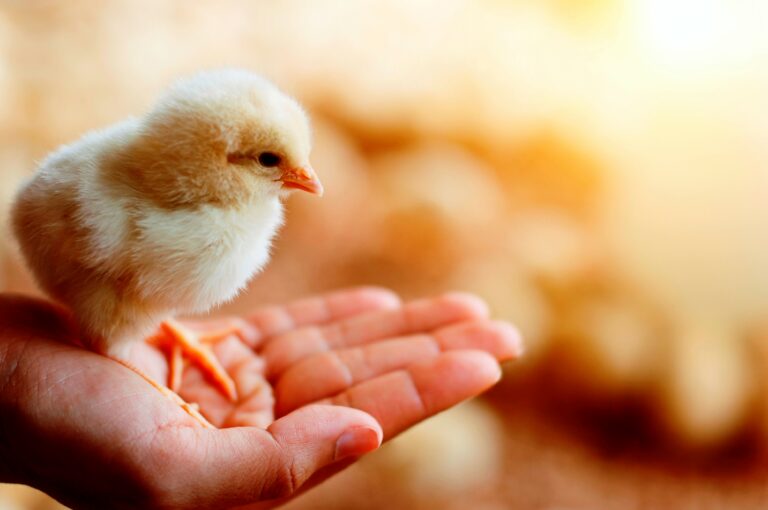Management in the first four days of a chick’s life is crucial to support its physiological needs and ensure optimal development.
“With average broiler slaughter age around 37-39 days, the first four days represent around 10% of total lifetime,” says Chloe Paine, Trouw Nutrition GB poultry nutritionist and technical manager. “In this time the chick’s body weight will increase by around 190% making it a crucial developmental stage.
“Newly hatched chicks have high dietary requirements to help them mitigate the effects of dietary changes and transportation at the same time as they experience a reduction in maternal antibody levels.”
She says in many commercial operations there can be a delay in how quickly chicks get access to feed and water. This can compromise productivity, as the longer chicks are away from feed and water the lower their growth rate and the higher the mortality, both of which will impact on profitability.
In addition, fasting before arrival on farm can delay the development of the intestinal mucosa and impair nutrient absorption.
“Most common feeding programmes only consider the first 10-14 days of the chick’s life as a starter feed, ignoring its specific needs in the first week, especially the crucial first few days after hatching.”
Paine says a focus on nutrition in the first four days and the feeding of pre-initiating diets can result in more robust chicks with better early life health. This can enhance lifetime performance, shortening productive cycles and improve final body weight, carcass weight and meat yield.
“New research has helped define the requirements of early chicks. It shows chicks need a precise combination of functional proteins, amino acids, calcium and phosphorus.
“It is also important to recognise that nutritional requirements change rapidly over the first week of a chick’s life due to the continuous development of organs like the gastrointestinal tract and the immune system. The chick’s main source of nutrients also changes during this time.”
Immediately after hatching, the residual egg yolk is the main source of nutrients, but this role is gradually assumed by the food ingested. The digestive system of a broiler is immature after hatching, and the newly hatched chick has to deal with an abrupt metabolic switch from lipids and proteins from the egg yolk to complex dietary nutrients, including proteins. In particular, endogenous enzyme levels are low which reduces the chick’s ability to digest nutrients.
“The new research has helped us understand the extent to which specific protein sources and single amino acids can influence this transition and guided the development of diets to improve performance at this critical stage.”
Paine says the mineral supply is also important at this stage and using a pre-initiating diet for the first days after hatching, with reduced calcium levels increases the availability of phosphorus and helps improve skeletal development.
“The combined use of low calcium strategies and functional proteins has resulted in better feed efficiency, maximises the use of nutrients and generates greater production yield.
“Balanced nutrients in a diet specifically designed to address the actual physiological needs of chicks in their first days of life, as well as access to food immediately after hatching, positively impact chicks’ post hatch physiological development and can improve their performance later in life.”
The physical form of feed is also important. Paine says feeding a micro-pellet helps ensure a good feed intake, better digestibility and availability of nutrients.
Trouw Nutrition has developed Chickcare to specifically improve performance in the crucial first four days. Containing functional proteins and a careful balance of calcium and phosphorus and other trace minerals, it is produced as a two-millimetre micro pellet to boost intakes and digestibility.
In addition to providing a specifically formulated feed to improve early chick performance and development, Paine advises paying attention to overall management.
“Chicks should never have to search for feed or water and maintaining correct ambient temperatures and air movement so the environment is optimal are also important.’’
Paine says the benefits of a focus on nutrition in the first four days can be considerable. Feeding diets especially formulated for chicks in the first few days after hatch results in more robust chicks and supports early life health. Getting chicks off to a good start improves feed conversion throughout their life.
“The economic impact can be significant with improved final body weight, higher carcass weight and greater meat yields. At the same time productive cycles can be shortened.
“Every time the broiler lifecycle is reduced through genetic improvement in particular, the importance of management in the first four days increases,” Paine adds.
Technical advice: Why the first four days are critical to chick success

Previous ArticleComment: Why we’re considering cooling systems for our breeders
Chloe Ryan
Editor of Poultry Business, Chloe has spent the past decade writing about the food industry from farming, through manufacturing, retail and foodservice. When not working, dog walking and reading biographies are her favourite hobbies.

